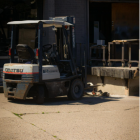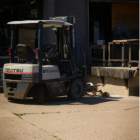When it comes to running a successful operation, having the right equipment is crucial. For many businesses, this includes finding the best deals on forklifts for sale.
Whether you’re a warehouse manager, a logistics professional, or a small business owner, a forklift can be a game-changer. But with so many options available, how do you make the right choice?
This guide is here to help. We’ll walk you through everything you need to know about finding the best deals and options for new and used forklifts for sale.
From understanding your specific needs to finding a reputable forklift dealer, we’ve got you covered. We’ll also delve into the pros and cons of new versus used forklifts, and how to inspect a used forklift for quality and reliability.
By the end of this guide, you’ll be well-equipped to make an informed decision and find the best forklift for your needs. Let’s get started.
Understanding Your Forklift Needs
Before you start searching for forklifts, it’s vital to assess your needs. Consider the tasks your forklift needs to perform.
Think about the types of loads you will be handling. Load capacity and lift height are crucial factors to consider.
Analyse the workspace where the forklift will operate. This will help determine the right size and type.
Consider fuel types, such as electric or diesel, and their implications on your operations. Each has distinct benefits and limitations.
Lastly, evaluate any specific features you need, like safety options or technological advancements. Tailoring these to your operations ensures you make an efficient investment.
New vs. Used Forklifts: Pros and Cons
When considering purchasing a forklift, you have the option of choosing between new and used models.
New forklifts come with numerous benefits. They feature the latest technology and typically include comprehensive warranties.
New models often boast improved safety features, enhancing operator protection. You also gain the peace of mind that comes with reliability.
However, new forklifts are more expensive upfront. This can be a significant factor, especially for smaller operations.
In contrast, used forklifts offer a lower initial investment. This can be attractive if you’re working with a limited budget.
They also depreciate less quickly than new models. This can result in a better long-term value.
Inspect used forklifts for wear and ensure they’ve been well-maintained. This helps avoid potential issues down the line.
Here’s a quick comparison:
- New Forklifts: Latest technology, reliable, expensive
- Used Forklifts: Lower cost, potential higher maintenance, requires thorough inspection
Understanding these pros and cons helps you make an informed decision.
How to Inspect a Used Forklift
Inspecting a used forklift thoroughly is crucial before making a purchase. Start by examining the exterior for any visible damage.
Check for cracks, rust, and wear that could indicate misuse or neglect. Focus on the condition of the forks and mast.
Next, inspect the tires for wear or damage. Worn tires can affect the forklift’s stability and operation.
Pay attention to the engine and hydraulics. Look for leaks and listen for unusual noises during operation.
Finally, ask to see the service records and any maintenance logs. A well-documented history is often a sign of good care.
The Total Cost of Forklift Ownership
Understanding the total cost of owning a forklift is crucial. This extends beyond the purchase price.
Consider ongoing expenses like maintenance, repairs, and parts replacement. These costs add up over time.
Fuel or energy consumption is another key factor. Electric forklifts may have lower operational costs but higher initial prices.
Depreciation impacts your investment’s value. Used forklifts depreciate slower, potentially saving money long-term.
Finally, insurance and taxes contribute significantly to ownership costs. Don’t overlook these when budgeting for a forklift.
Finding a Reputable Forklift Dealer
Selecting a reputable forklift dealer is essential for a worthwhile purchase. Look for dealers with a strong track record in the industry.
Research customer reviews and testimonials online. Feedback can reveal a dealer’s reliability and service quality.
Verify the dealer’s product range. A wide selection of both new and used forklifts offers more options.
Check if the dealer provides comprehensive after-sales support. This includes maintenance services and parts availability.
Finally, consider the dealer’s longevity and reputation in the market. Established dealers are often more reliable.
Forklift Certifications and Safety Features
Certifications are crucial when choosing forklifts. They ensure the equipment meets safety standards.
Look for forklifts with essential safety features. These can include load backrests and high visibility masts.
Operator training is also important. Proper certification can prevent accidents and enhance productivity.
Check if the forklift includes an onboard diagnostic system. This helps in maintaining optimal safety conditions.
Certifications and safety features reduce risks in your operations. They provide peace of mind and safeguard both workers and goods.
Financing Options for Your Forklift Purchase
Financing offers many benefits when buying forklifts. It can ease the upfront costs for businesses.
Leasing is a popular option. It allows access to new forklifts without the need for full payment.
Consider hire purchase agreements. They let you use the equipment while paying in installments.
Some forklift dealers offer in-house financing plans. These plans often come with tailored terms and conditions.
Explore different options and read the fine print. This helps avoid unexpected costs and helps manage your budget better.
Negotiating the Best Forklift Deal
Negotiating is key to securing a great deal on forklifts for sale. Start with thorough market research to know competitive prices.
Always compare quotes from various forklift dealers. This gives you an idea of average costs and potential discounts.
Don’t hesitate to ask for additional perks. Extras like free delivery or maintenance services can add substantial value.
Understand the dealer’s negotiation flexibility. Some dealers offer discounts on bulk purchases or special promotions.
Be prepared to walk away if terms aren’t favorable. This tactic often encourages dealers to offer better terms to close the sale.
After-Sales Support and Maintenance Services
Investing in forklifts means considering after-sales support. This support ensures your equipment remains functional.
Quality after-sales service includes regular maintenance checks. These checks help prevent costly breakdowns and extend forklift life.
Choose dealers who offer comprehensive maintenance packages. Such packages should cover parts and labor to prevent unforeseen expenses.
Look for dealers with skilled technicians. Their expertise ensures your forklifts receive proper care and troubleshooting.
Consider the availability of spare parts. Quick access to parts minimises downtime and maintains operational efficiency.




